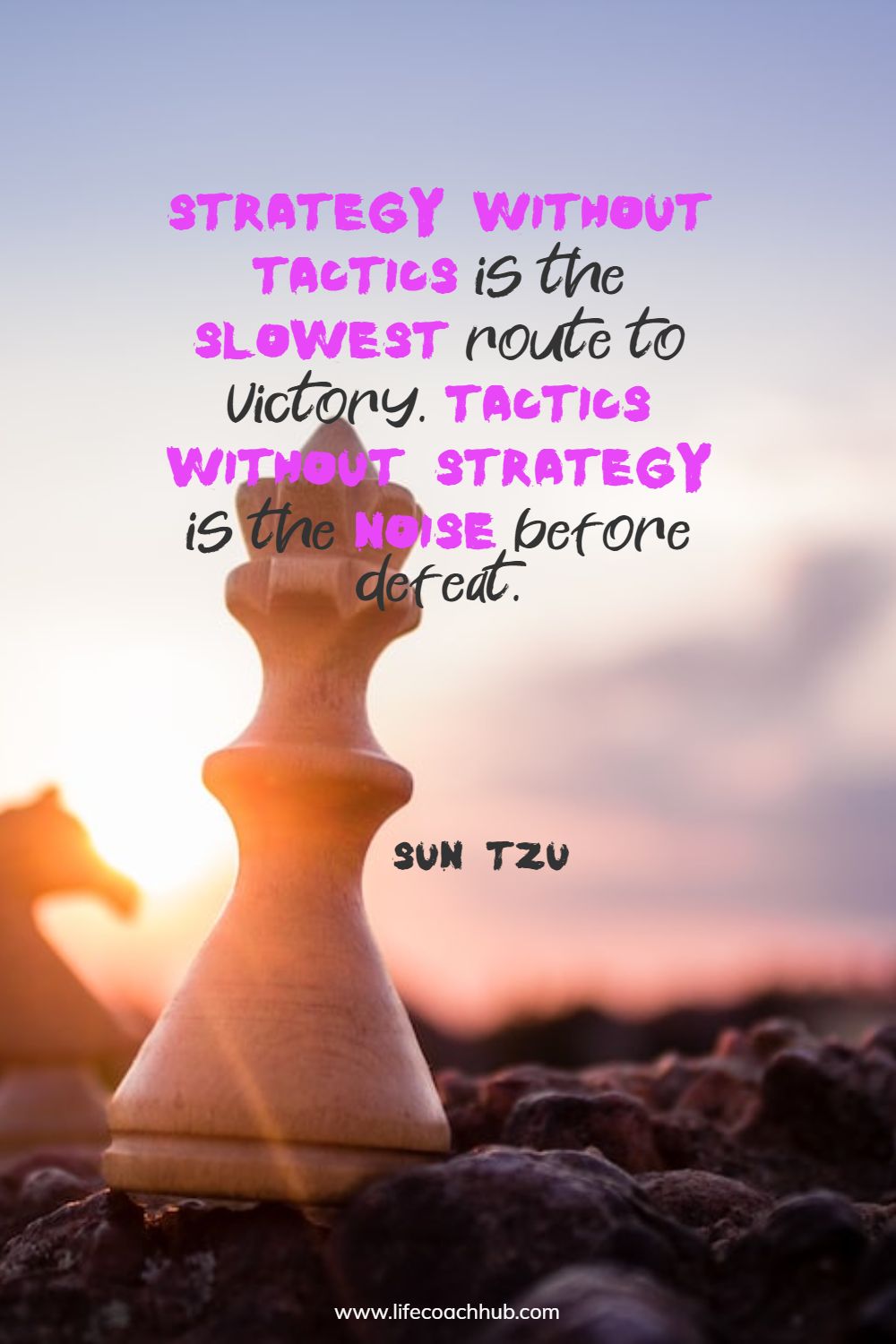
Ready to get started right away? Download your free life coach marketing plan template here;
***
If you think your brilliant business idea or extraordinary life coaching services will steer you on a guaranteed path to success - think again.
With our current uncertain business conditions, offering a spectacular service may not be enough. Clients come and go, but a critical question remains - are you reaching out to the right prospects? And how confident are you that your services still solve your target clients' needs? These are only some of the critical business issues that are solved by a marketing plan.
Let’s look at 5 more reasons why you need to create a marketing plan when you have your own life coaching business.
- Gives you an in-depth analysis of your business.
- Ensures your vision, mission, and goals fit with your marketing efforts.
- Aligns every team member towards your targets.
- Keeps your team focused on where it needs to be.
- Enhances decision-making as you tackle issues before they arise.
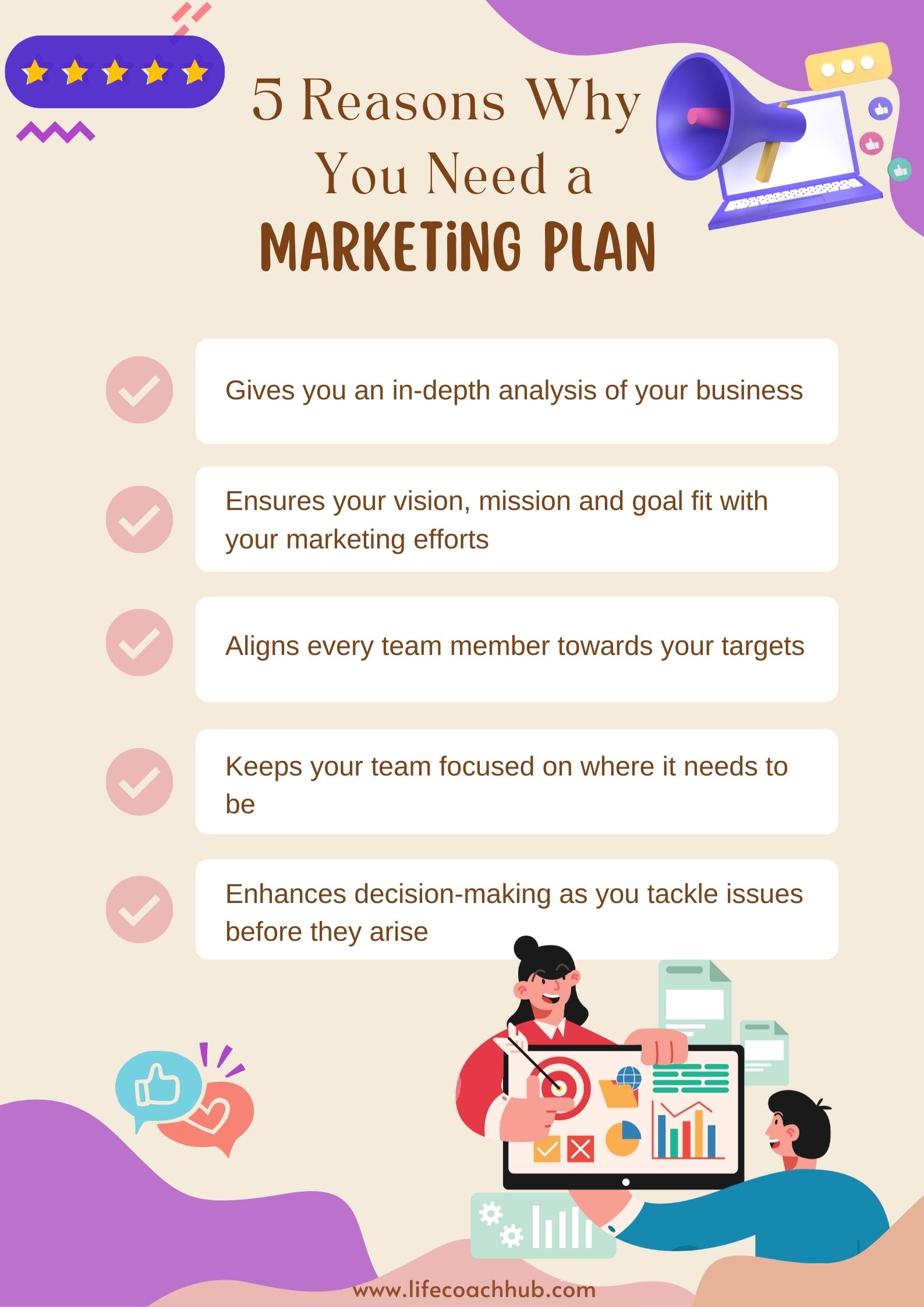
A 2020 Global Coaching Study conducted by the International Coaching Federation (ICF) revealed that in 2019, the estimated number of coaches worldwide increased to 71,000, a 33% increase from 2015. With the growth of practitioners worldwide, the number of managers and leaders getting coaching skills had also grown by almost half (46%).
These numbers only prove the increasing need and popularity of life coaching as a profession and its role in supporting the personal and professional development of individuals in general.

These numbers only prove the increasing need and popularity of life coaching as a profession and its role in supporting the personal and professional development of individuals in general. The same study also shows a 21% increase in the estimated global revenue from coaching, amounting to $2.849 billion U.S. dollars.

Revenue is a crucial indicator that, so far, you’re doing something good for your business and for the whole industry as well. Though we don’t want our eyes to be solely focused on the financial aspect, we need to put an extensive amount of consideration into our marketing strategies and performance if we wish to keep our coaching businesses thriving.
Review of a Marketing Plan and a Business Plan
Remember how you managed to prepare your business plan?
If you recall our previous article, How to Write a Business Plan for Life Coaches (where we also offered a free business plan template), a business plan outlines the steps you need to take to reach your business goals.
It essentially consists of a detailed breakdown to help you run your coaching business, create, and achieve your goals while considering key factors such as your clients, products and services, marketing and sales, operations, and finances.
In a nutshell, a business plan provides a complete action plan to take when running your business, whereas a marketing plan is a portion of the business plan that aims to develop a marketing strategy to make your services known and remembered, reach your target audience, and lead your prospects to purchase your services.
How To Write a Life Coaching Marketing Plan

#1 Craft an Executive Summary
It takes a compelling offer driven by effective marketing to attract prospects and lead them to believe in your services. Use marketing as your bridge to connect with your target clients.
Your life coaching marketing plan needs to always be focused on delivering your brand voice. Think of your all-time favorite ad. What was it about? How did its message resonate with you?
Now, imagine your coaching business. How will you craft your brand’s story to be remembered?
To ensure the smooth flow of your company narrative, start by creating an executive summary. Your summary needs to be comprehensive enough to lay your vision, mission, and unique value proposition (which will be explained in detail in Step 2) for your prospects while briefly discussing your marketing goals based on the trends from your market research.
To outline your purpose, you need to tie your vision to your value proposition; in other words, why will your prospects purchase your services? Why not just buy from another coach?
You can attach some proof in your “why” through insights you gained from doing your market research. Provide a quick snapshot of the customer needs and preferences, how well your competitors are doing to serve the need, and other industry trends to add flavor and interest to your value proposition.

Depending on the type of marketing plan you’re making, whether it’s for the launch of your coaching services, a more focused social media marketing plan, or even a time-based one that accounts for a specific business season and other conditions, being consistent in your story matters.
Emphasize the bottom-line figures and expected results once your target client signs you up.
Putting it Into Action: Example Life Coaching Marketing Plan Executive Summary
Here is an example of the Executive Summary section for a life coach marketing plan you can draw on for inspiration.
Company name: Soulful Self Alignment
1. Executive Summary
Vision: To bring positive change and allow individuals to realize their full potential.
Mission: To inspire as many individuals as possible. To cheer them on in chasing their dreams while believing in their abilities and uncovering hidden talents.
Purpose: Every day, we want everyone to wake up, leave for work, and go to bed with a grateful heart – and it all starts by supporting them in doing something that inspires them.
Target market: Young professionals between 25 to 40 years old who suffer from a quarter-life or midlife crisis.
Unique Value Proposition (UVP): – Chase your dreams while you’re at them. Don’t let them chase you.
Research insights
Clients’ coaching needs/preferences:
- Clients want a mix of online and face-to-face coaching.
- Typical areas where the clients' struggle are career paths, relationships, and life goals.
- Top 5 priorities: career, family, other relationships, saving for future needs, travel
Other Coaches/competitors' offer/services:
There are several competitors in life coaching, particularly in the motivational coaching field. Three main competitors were identified as they all provide similar services and capture the same market; however, the number of competitors is continuously growing.
Coaching industry trends:
The impact of the global pandemic on the coaching industry has been massive, mainly on the coaching method used. From 2019 to 2021, 98.3% of coaches used online coaching (Passmore, 2021).
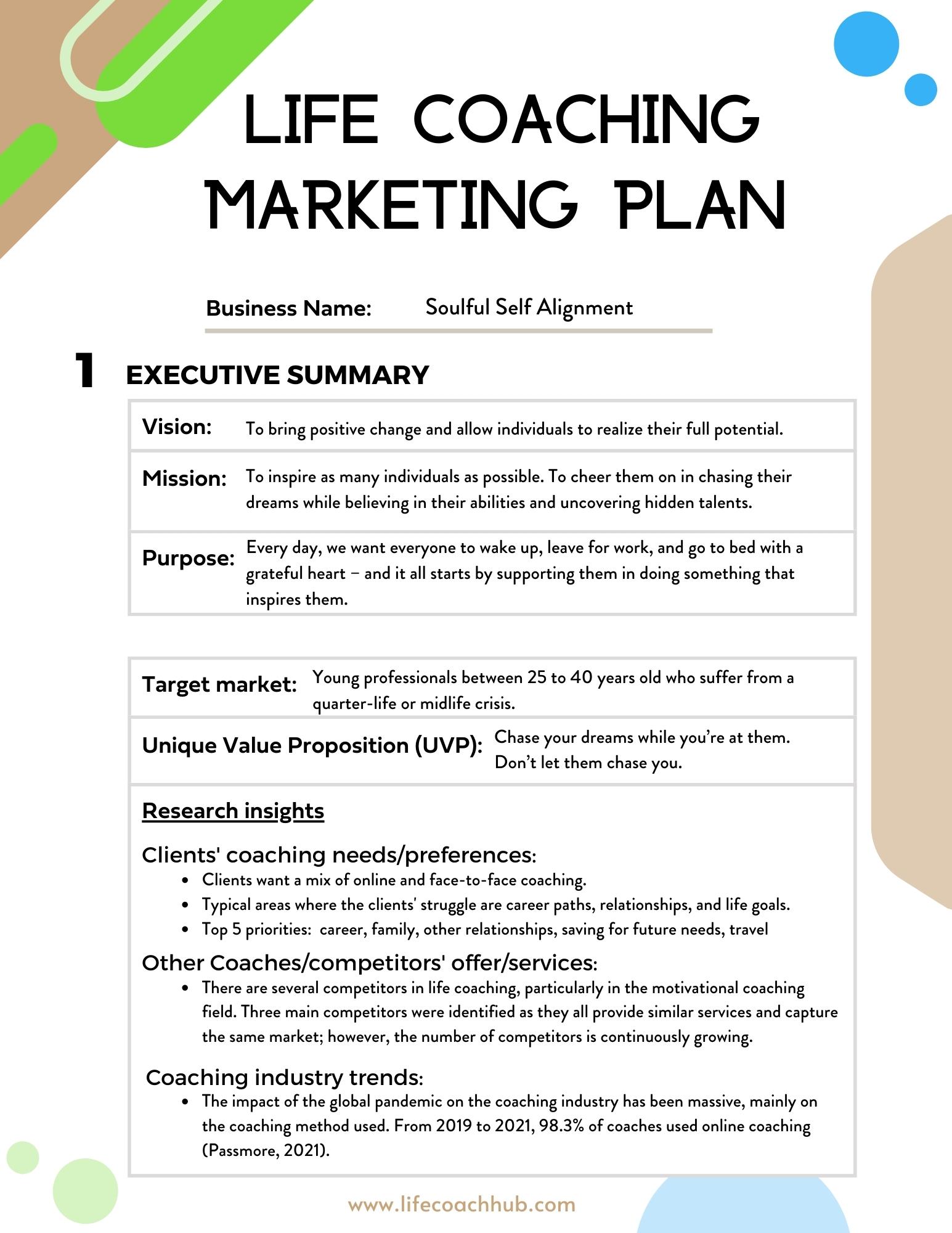
#2 Establish your target market

Identifying your target audience won’t be thorough without your market research findings.
You may be wondering how you can afford to conduct such a study since your hands are already full of all that’s going on in your coaching business. But believe me. It will help you a lot, whether you’re eyeing short-term goals such as reach and exposure, or long-term goals such as sustained profitability. Leave your worries aside and start with what you have.

The essence of conducting proper research
Market research may be quite a massive and overwhelming idea for some. But to get through the overwhelm, imagine it in its simplest sense: knowing your customers.
If you can conduct a short survey to gauge the needs and preferences of your target clients, well and good. Get ready with your open-ended and closed-ended questions, with a sprinkle of Likert scale questions.
A typical marketing questionnaire contains 3-5 sections, each section drilling down to the specifics of your respondents. These are demographics, descriptive, psychographics, products or services tried, and the purchase intention of your offered services.
Apart from a market survey, you can also perform focus group discussions (FGDs) to gain more insight into your target market’s needs, wants, and pain points. From my experience as a market researcher, FGDs are breeding grounds for bright ideas. It is also where marketers often get the “tagline” in a product or service’s promos.
Identifying your unique value proposition
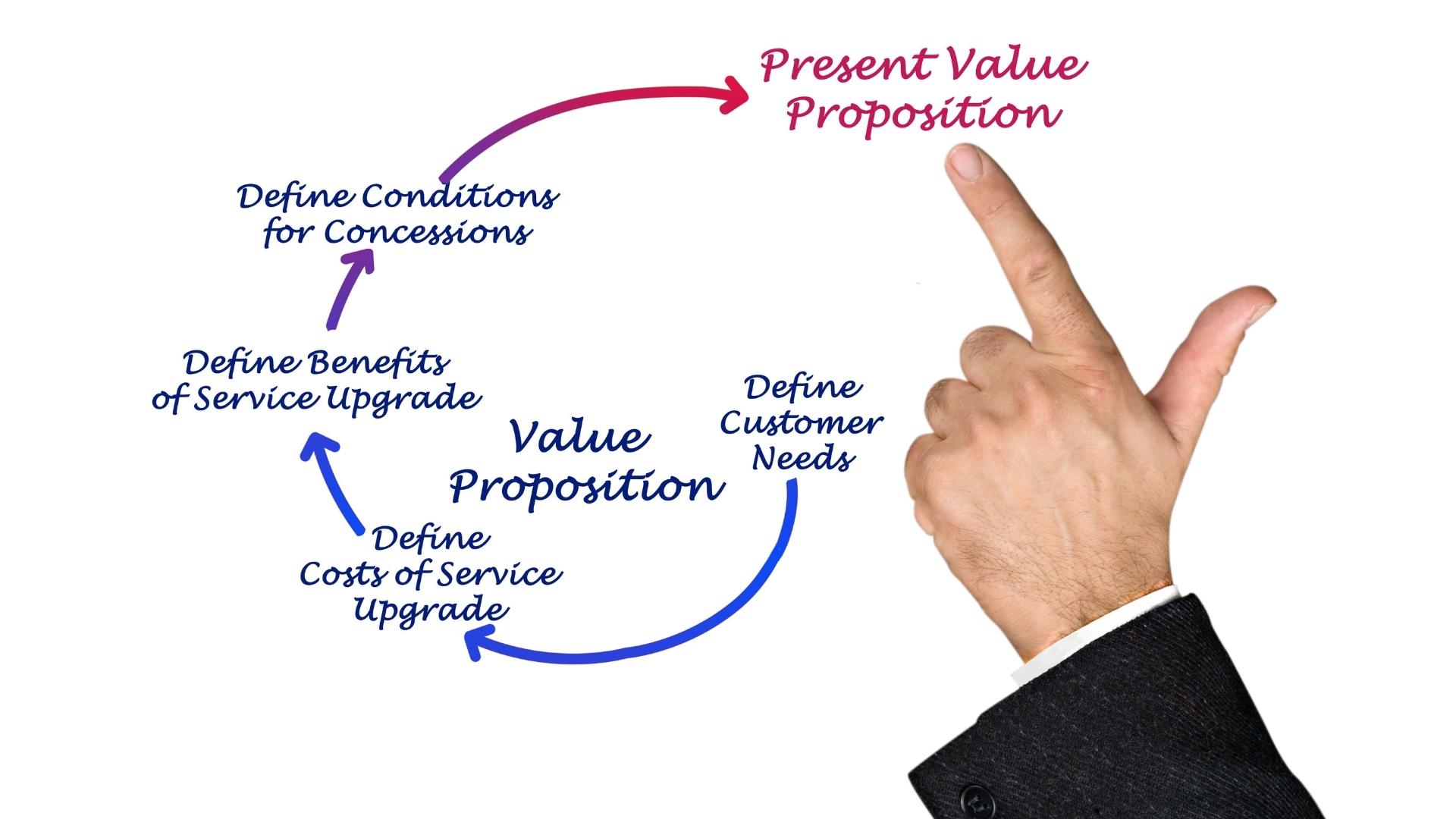
Once you've identified your target clients, zoom in on their struggles, worries, and fears, while seeking ways where you can help them solve their pain points.
At this stage, your unique value proposition (UVP) comes in handy – a clear statement that describes to your customers why they would choose your services. In other words, what makes you different from your competitors? Build your offer from there to stand out.

For example, are your target client executives in a multinational company who wish to enhance their leadership skills? Then you may want to offer valuable leadership tools and techniques to support them in leading their direct reports.
Or are you catering to small and medium enterprises (SMEs) human resources departments for a motivation boost and team building? If so, you can initially provide a group session to increase their motivation and engagement that would address their concerns.
The key is understanding your target clients deeper to find practical solutions that help them live better lives.
Putting it Into Action: Example Life Coaching Marketing Plan Target Market
Let’s continue with our previous example from Step 1 by outlining an example of Soulful Self Alignment’s Target Market section of their Marketing Plan.
2. Target Market
Market research highlights
A. Quantitative/ Survey results
- A total of 426 respondents between the ages of 25 to 40 years old submitted their responses through SurveyMonkey.
- Findings indicate that 73.2% prefer their initial coaching session as a casual in-person talk to establish rapport and trust.
- The top 3 areas where the clients' struggle are career paths, relationships, and life goals.
- Prospects' top 5 priorities (in order of importance) are career, family, other relationships, saving for future needs, and travel.
B. Qualitative/ FGD results
8 respondents (25 to 40 years old) were gathered for an FGD. Below are the insights gained.
- Career path – whether their present career suits them most, how to grow in their chosen career, and not wanting to work in a stressful environment in their 50s/60s
- Relationships – not excited with the idea of settling down, balancing time among relationships (family, friends, boy/girlfriend)
- Life goals – finding a stable job that provides a steady flow of income, building different funds for emergencies, housing/properties, travel, and liquid investment
Target market
A. Demographic Description
Young professionals between 25 to 40 years old who suffer from a quarter-life or midlife crisis.
They are from middle-income families who live in the metro area, are impulsive buyers of the latest trends in fashion and technology, and want to be the first visitors to newly opened restaurants or coffee shops.
B. Pain points
- Career path - suitability, growth, not ending up in a stressful environment
- Relationships - settling down issues, time management
- Life goals - job security, consistent income, fund/asset management
C.Target clients' coaching needs/preferences
- Clients prefer a mix of online and face-to-face coaching.
- Top 5 priorities: career, family, other relationships, saving for future needs, travel
Unique Value Proposition (UVP): Chase your dreams while you’re at them. Don’t let them chase you.
(Driving clients to find their passion and pursue their dreams.)
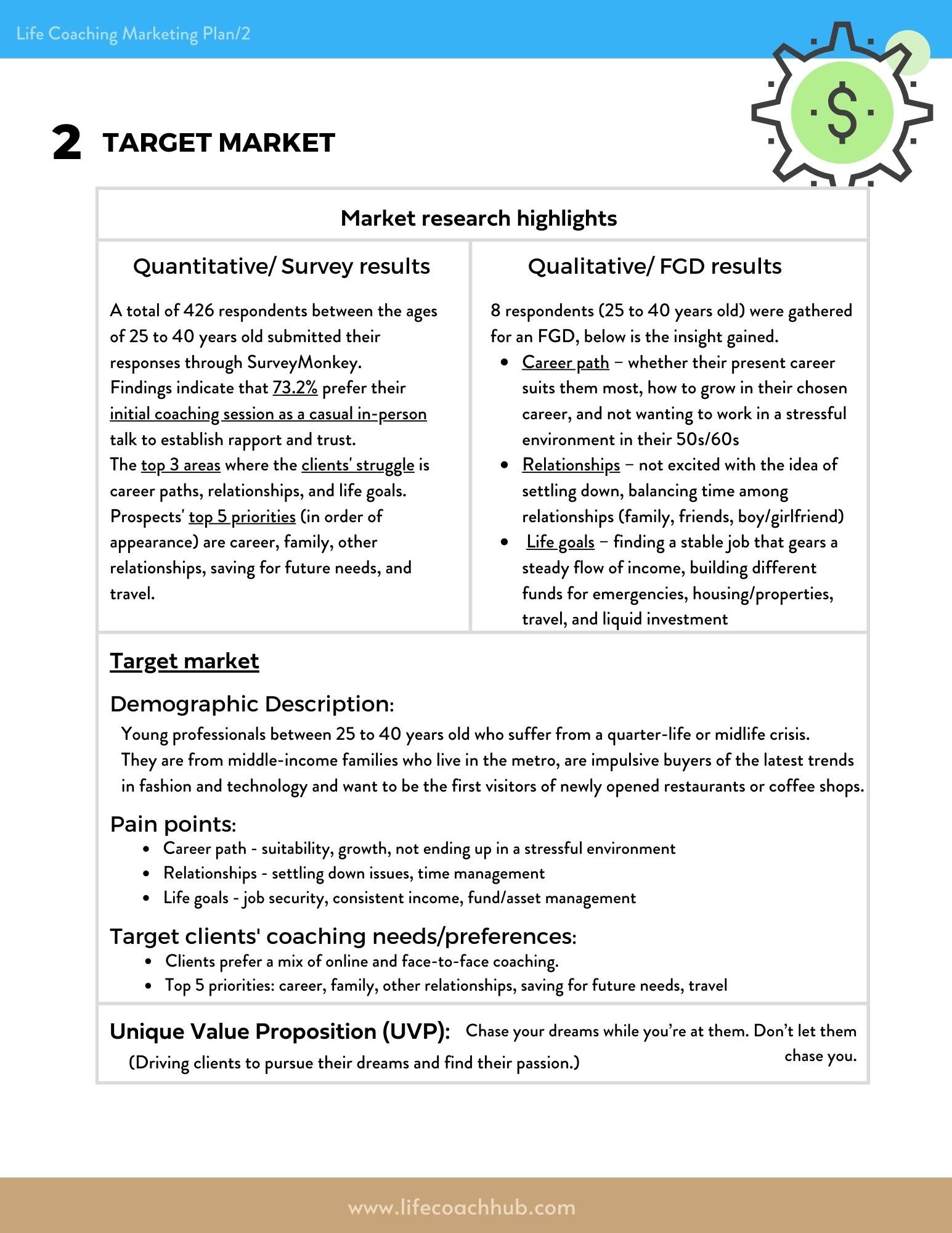
#3 Develop marketing strategies and set control measures
As with any successful plan, ensure you have attainable timelines along your stated goals. More importantly, set effective measures such as Key Performance Indicators (KPIs) or Objectives and Key Results (OKRs) to check your progress.

Once you’ve successfully established who you want to serve, here’s the more exciting and fun part – envisioning your marketing strategies for implementation.
Knowing your audience, what types of marketing appeal to them the most? Unleash your playfulness and creativity in producing marketing tactics across various media platforms. Explore diverse sales networks such as engaging direct sales, hiring sales representatives, or tapping online platforms.

To start with, write down your short-term and long-term marketing goals beside your strategies, right below your overall marketing objective. Your short-term goals are generally achieved in a year or less such as setting lower prices for promos and pay-per-click (PPC) ads. While long-term goals take more than a year to attain such as creating optimized content and maximizing the use of social media to enhance your brand awareness and recall.

Here are some popular channels you can use with your marketing strategy.
- Email marketing
- SEO content
- Social media marketing
- Television
- Radio
- Podcast
- Print materials
- Events
- Networking
As with any successful plan, ensure you have attainable timelines along your stated goals. More importantly, set effective measures such as Key Performance Indicators (KPIs) or Objectives and Key Results (OKRs) to check your progress.
By using quantitative indicators, you get a picture of how well you’re doing and how far you have to go to reach your goal. These measures are crucial factors in your implementation as they send a signal about whether you’re on the right track or if you need to adjust your marketing efforts.

Don’t be afraid to try various advertising or promotional strategies, even more if it doesn’t break the bank. Focus on your goal, and get close and personal with your target market.
Putting it Into Action: Example Life Coaching Marketing Strategies
Let’s continue with our example of Soulful Self Alignment. Here we will outline an example of the Marketing Strategies they might decide upon in their Marketing Plan.
3. Marketing Strategies
Marketing Objective: To be a market leader in the field of motivational coaching
|
Short-term Goals |
Marketing Strategy |
KPI |
|
1 Enhance brand awareness |
PPC advertising |
No. of clicks/visits |
|
2 Generate brand interest |
Email marketing |
No. of sign-ups, ROI |
|
3 Expand client base |
Attend networking events |
No. of prospects/ discovery calls after the event |
|
4 Grow connection with prospects |
Sign up business in coaching directories |
No. of paid follow-up sessions |
|
Long-term Goals |
Marketing Strategy |
KPI |
|
1 Raise brand exposure |
Social media marketing |
No. of followers |
|
2 Increase brand recognition |
Publish SEO articles on company website |
No. of website visits, conversions |
|
3 Develop brand positioning |
Conduct webinars and conferences |
Sales revenue from no. of attendees |
|
4 Boost customer retention |
Online group coaching |
Customer Lifetime Value |
Here’s how you can drill down to your marketing strategies.
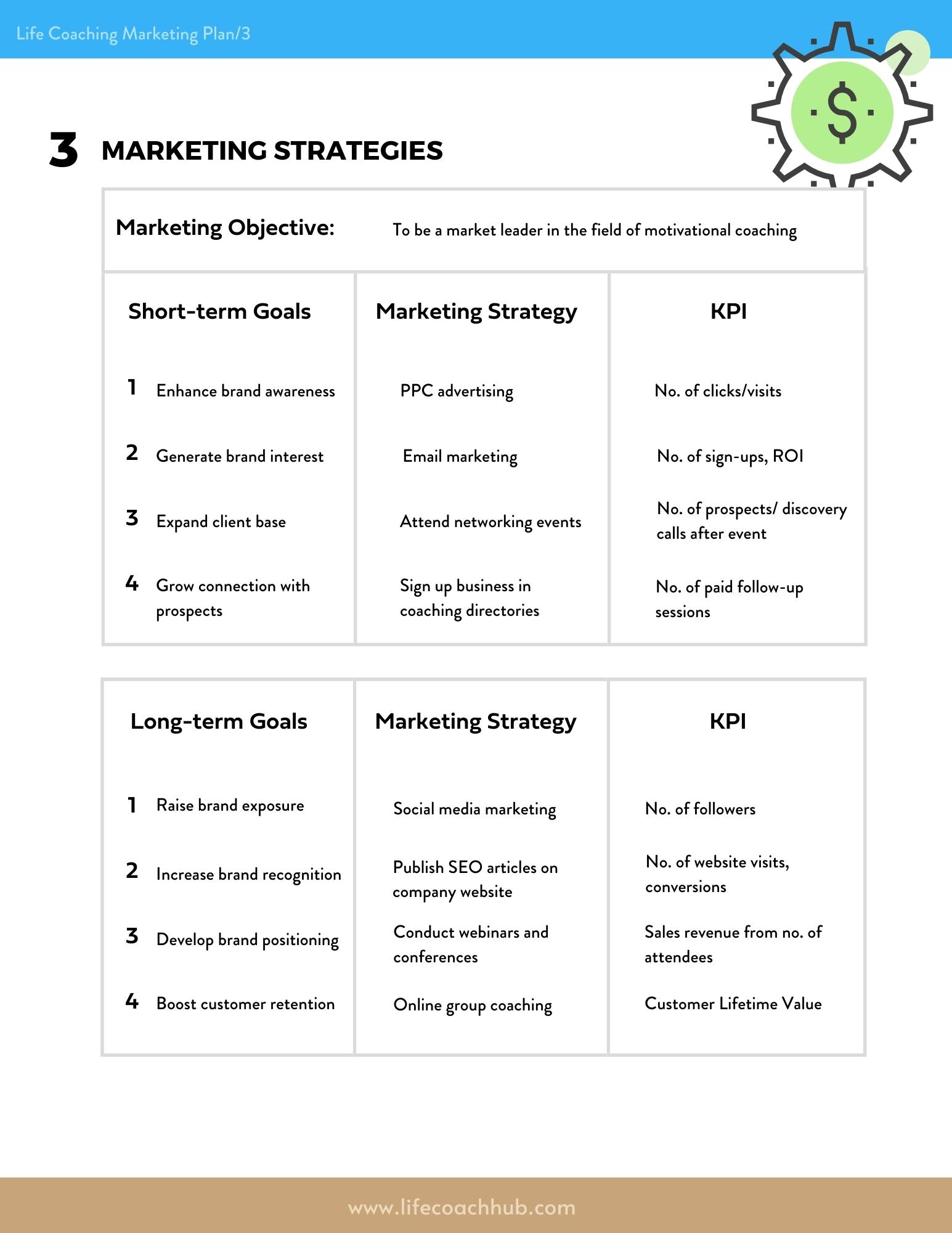
The International Journal of Evidence Based Coaching and Mentoring reveals that a big chunk (41.9%) of ICF coaches’ prospects are individual professionals and executives. Referrals also appear as ICF’s primary method of drawing in clients. More than half (57.6%) of coaches admitted that their clients’ paved the way for them to gain more prospects, while 42.1% said referrals were made by other professionals.

The study also revealed that 58.9% of coaches spend less than $100 a month on marketing strategies. 27.7% of coaches allot 11-20 hours to marketing alone, while others (25.9%) spend 6-10 hours doing a mix of business activities such as marketing, professional development, and management of their business.

For a more detailed look at marketing for life coaches, please take a look at our article on this very subject!
#4 Determine your budget and financial resources
Ultimately, marketing your coaching business generates customers that drive sales. However, you need to strike a balance since marketing can hurt your company if it goes overboard or when you don’t stick within your budget.
Speaking of marketing strategies not breaking the bank, having a set budget in place keeps you rooted in the reality of how far you can go with your marketing strategies.

For example, as a startup, it doesn’t mean you need to entirely scrap the television ad idea. But why not try other sales channels initially that can enhance brand awareness and “park” the TV ad in the meantime? By seeking more practical methods, you allow yourself to be creative and resourceful by working with what you have.
Ultimately, marketing your coaching business generates customers that drive sales. However, you need to strike a balance since marketing can hurt your company if it goes overboard or when you don’t stick within your budget.

Here’s what you can do - for all the strategies you identified earlier:
- Note the estimated cost
- Analyze the expected timeframe for achieving your goals, and
- Check other resources you can tap into to lessen the cost
Directly linking your promotional efforts to your allowable budget and goals enhances your decision-making process if it's sensible enough and worth it to push through such activities.

Putting it Into Action: Example Life Coaching Marketing Plan Budget
Let’s continue with our example of Soulful Self Alignment. Here we will outline an example of the Marketing Strategies they might decide upon in their Marketing Plan.
4. Budget
|
Marketing Strategy |
Estimated Cost per Month |
# of Months to Achieve |
Other Resources |
|
1 PPC advertising |
$300 |
6 |
Facebook, Instagram, and Pinterest ads |
|
2 Email marketing |
$100 |
6 |
|
|
3 Attend networking events |
$250 |
12 |
Attend events with low rates/free memberships |
|
4 Sign up business in coaching directories |
$37 |
12 |
|
|
5 Social media marketing |
$50 |
18 |
|
|
6 Publish SEO articles on your website |
$2,500 |
18 |
Hire 2 writers/designers ($900/mo.) |
|
7 Conduct webinars/ conferences (With print materials); 100 participants, 4 speakers x 3 events |
$18,200 |
18 |
Self as 1 speaker, Invite speakers from universities (business, psychology) |
|
8 Online group coaching (With print materials); 25 participants |
$675 |
18 |
Send materials online |
Overall Allowable Marketing Budget: $ 2,000.00
Top 3 Marketing Strategies:
|
Marketing Strategy |
Projected Cost |
Projected Return |
Budget |
|
1 Email marketing |
600.00 |
22,800.00 |
600.00 |
|
2 Sign up business in coaching directories |
444.00 |
8,250.00 |
444.00 |
|
3 Social media marketing |
900.00 |
5,130.00 |
900.00 |
|
Total |
$ 1,944.00 |
$ 36,180.00 |
$ 1,944.00 |
Every marketing strategy definitely needs a budget. Below can be your inspiration to make yours.
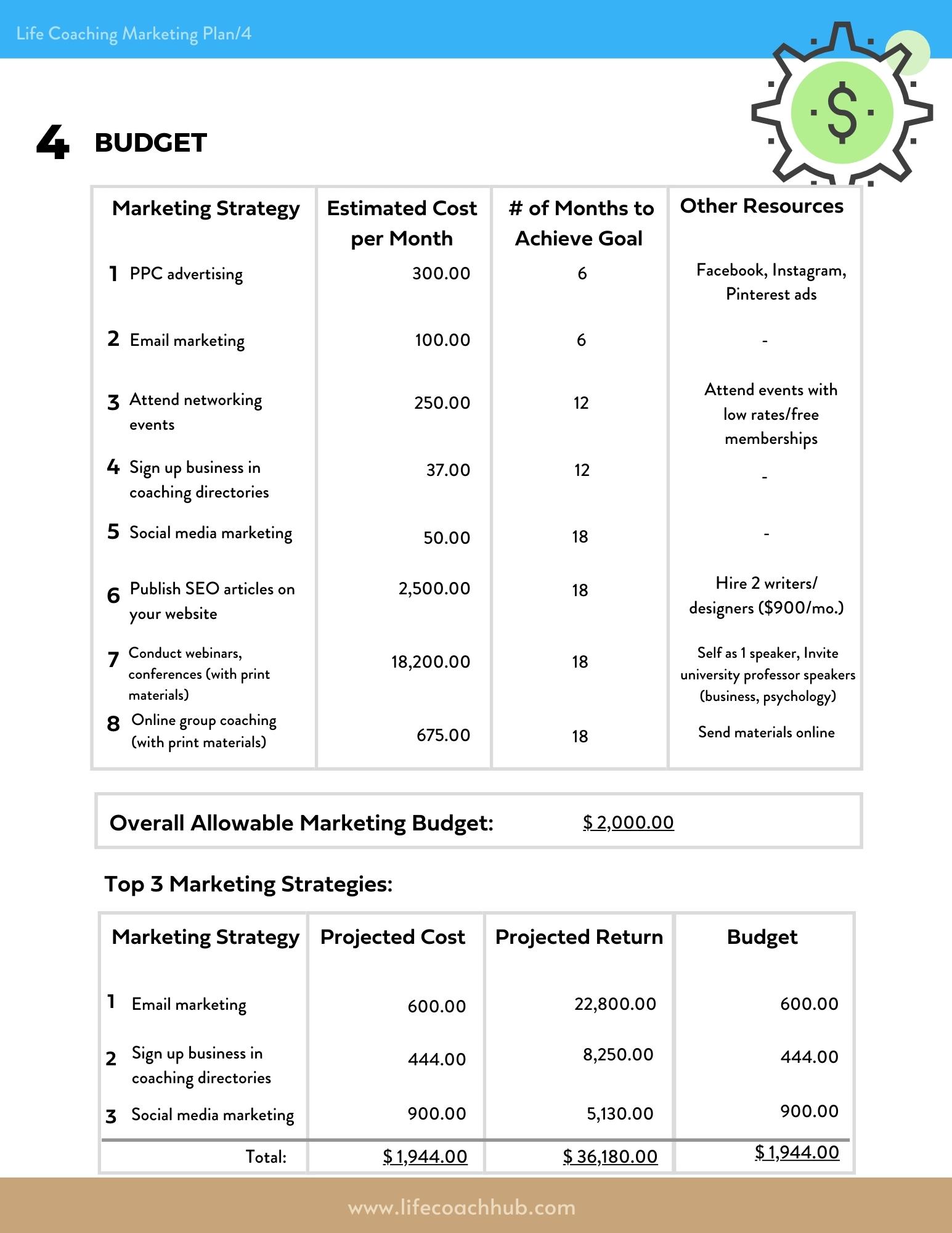
#5 Monitor results and tweak your marketing plan
The beauty of having a plan is it allows you to think ahead so as not to get caught unaware when bad days come. Living in an uncertain world somehow eases the worry as a business owner when you have a backup.

But often, things don’t always go as we planned, and that’s when I came across this saying, “If the plan doesn’t work, change the plan, never the goal.”
Thus, when you see the results of your marketing plan and something’s not performing as how you expect it to, feel free to adjust your strategies. For example, if eventually, email marketing loses its shine as one of the top methods to enhance conversions, put more focus on social media or mobile marketing.

The crucial aspect is keeping track of your selling and promotional efforts based on your indicated metrics and timeframe. By consistently monitoring and tweaking your life coaching marketing plan, you ensure your services are in the right place and reaching the right customers.
Putting it Into Action: Example Life Coaching Marketing Plan Results Section
We’ll wrap up our exploration of Soulful Self Alignment with the Results section. Show me the money!
5. Results
|
Marketing Strategy |
Actual Cost |
Target Results |
Actual Results |
|
1 Email marketing |
600.00 |
22,800.00 |
21,300.00** |
|
2 Sign up business in coaching directories |
444.00 |
8,250.00 |
23,890.00* |
|
3 Social media marketing |
850.00 |
5,130.00 |
10,120.00*** |
|
4 Attend networking events |
500.00 |
16,500.00 |
14,900.00 |
|
5 Publish SEO articles on your website |
36,000.00 |
124,200.00 |
132,470.00 |
|
6 Conduct webinars and conferences (with print materials) |
34,000.00 |
90,000.00 |
120,324.00 |
|
7 PPC advertising |
1,800.00 |
6,000.00 |
9,980.00 |
|
8 Online group coaching |
1,800.00 |
12,174.55 |
12,100.00 |
Revised Top 3 Marketing Strategies based on Results (KPIs):
|
Marketing Strategy |
Projected Cost |
Projected Returns |
Budget |
|
1 Sign up business in coaching directories |
444.00 |
23,890.00 |
444.00 |
|
2 Email marketing |
600.00 |
21,300.00 |
600.00 |
|
3 Social media marketing |
850.00 |
10,120.00 |
850.00 |
|
Total |
$ 1,894.00 |
$ 55,310.00 |
$ 1,894.00 |
Don’t forget to monitor your results and adjust your strategies. Here’s how:
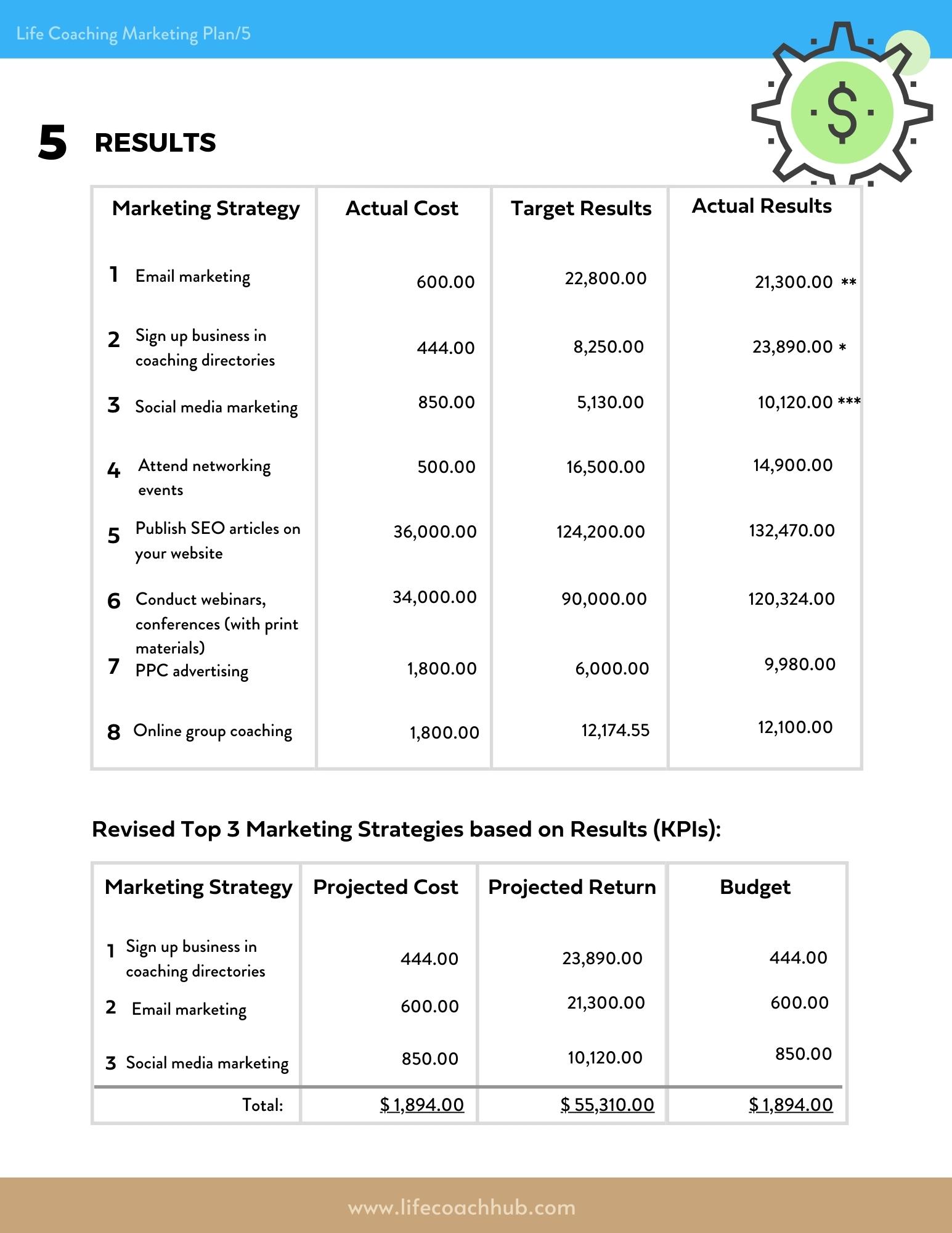
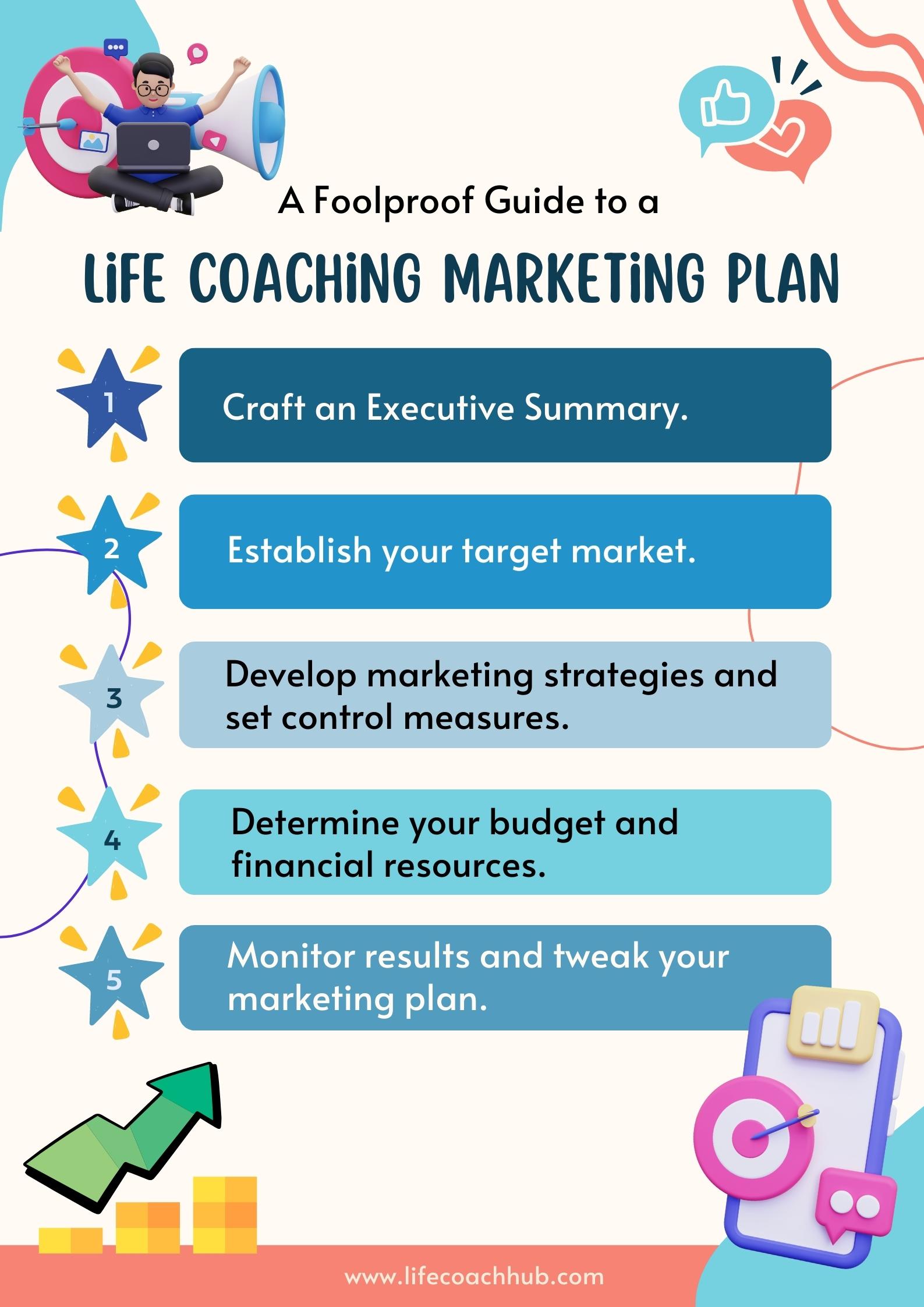
Final Thoughts
Most businesses are continuously evolving to keep pace with change, and customer needs and preferences. The coaching industry presents a golden opportunity as more clients embrace the value of coaching in their careers and personal lives.
As a coach, how will you position your brand and ensure that you can capture your target market?
Download your FREE Marketing plan template PDF
You’ve seen our sample marketing plan. Now it’s your turn! Download your free life coach marketing plan template here and get ready for more exciting opportunities!
You can also put some of those strategies into action. Get listed in our free coaching directory and check out our coaching software.
Glossary of Terms
- Vision. Your snapshot of the future and what you envision your business will achieve.
- Mission. How you will achieve your vision.
- Unique Value Proposition. The benefit you offer to your target market that is different from your competitors.
- Market research. The process of gathering information to understand your target market. Confirms and improves your business idea through consumer behavior and economic trends.
- Likert scale. Measures attitudes and opinions with a 5 or 7-point scale. It is mostly used as a satisfaction scale where your respondent identifies how satisfied or dissatisfied s/he is with a product or service. E.g. How much do you agree with this statement? “This is a great glossary” a) Strongly disagree b) Disagree c) Neutral d) Agree e) Strongly agree
- Marketing questionnaire. A list of questions used in quantitative market research to elicit responses from your target customers.
- Focus Group Discussion (FGDs). A form of qualitative research where a small group of people (often 5 to 8 respondents) with similar backgrounds or interests are gathered to discuss a topic of interest. They are often used to explore the meanings of survey findings or to collect more insight before crafting a questionnaire.
- Pain points. Current problems that your target customers experience.
- Key Performance Indicators (KPIs). A specific measure used to evaluate the performance of a project, activity, individual, or an entire organization. KPIs are closely linked with objectives and are used to evaluate targets. They also direct where resources should be allocated.
- Objectives and Key Results (OKRs). A strategic framework that is tied with key results; organizations often have 3-5 high-level objectives and 3-5 key results per objective. OKRs use specific metrics to track progress in reaching a goal. They are always quantifiable, and scores range from 0-100. OKRs also have a definite timeframe and are ambitious by nature.
FAQ
1. How do life coaches find clients?
The best strategy to find your initial coaching clients is through word-of-mouth. Inform your friends, family members, and even former colleagues of what you’re currently doing and offer to do a free session. Next, you can also ask them for referrals or if they know anyone needing coaching (mention your field of specialization).
2. How do I build a successful coaching business?
You can build a successful coaching business if you get real with your purpose and vision, identify and understand your target customers, consistently provide value with your services, and use marketing techniques to effectively reach out to your prospects.




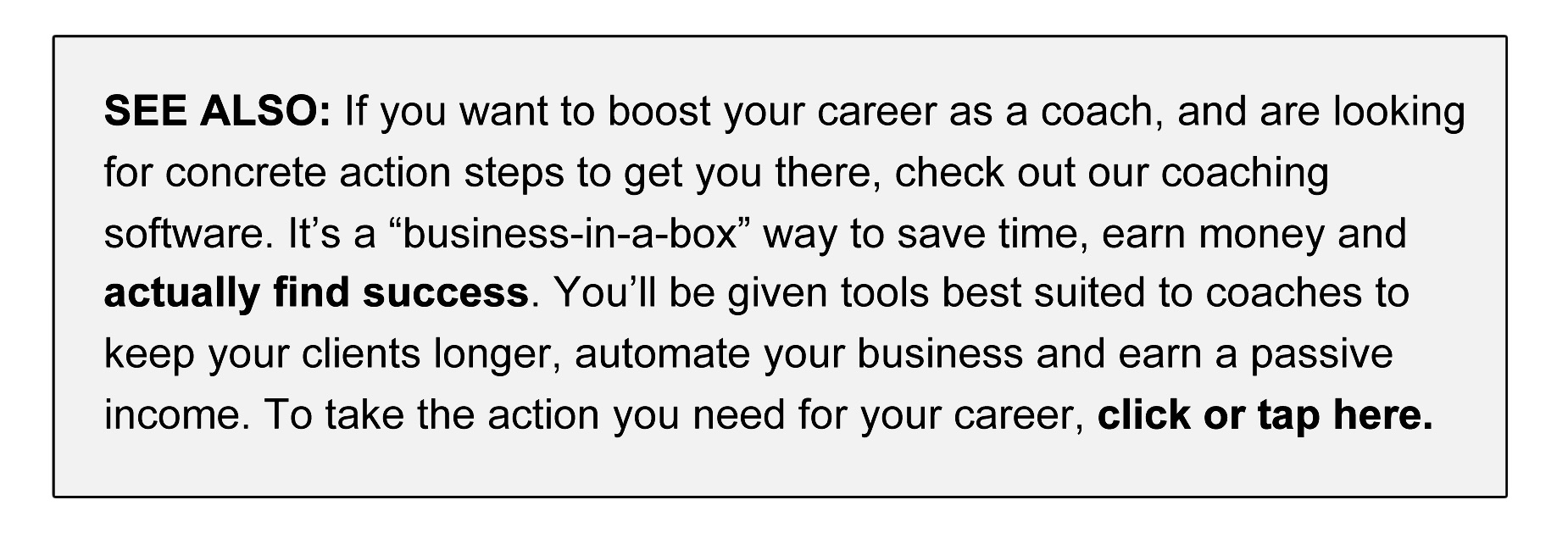















COMMENTS